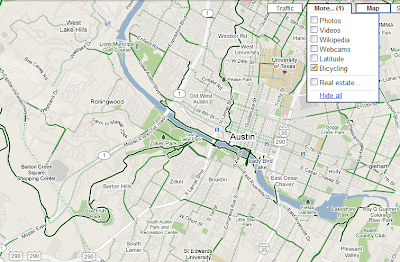Whenever I meet someone who finds out that I work on the directions team for Google Maps, the first question I’m asked is often “So when’s Google Maps going to add biking directions?” We’re big biking fans too, so we’ve been itching to give you a concrete answer. I don’t want to keep the good news a secret any longer, so the answer is: right now!
[youtube=http://www.youtube.com/watch?v=JN5_NBSu7Lw&feature=player_embedded]
Let’s say you want to bike to work, or maybe you want to drive less and spend more time outdoors. Biking directions can help you find a convenient and efficient route that makes use of dedicated bike trails or lanes and avoids hills whenever possible. To find biking directions, select “Bicycling” from the drop-down menu when you do a directions search:

So, how does it work? Well, I’m based in Seattle, along with the rest of the biking directions team. The city is notoriously hilly, but also has some great trails and a strong cycling community. Let’s say I’m trying to get from Golden Gardens to a friend’s house in Montlake:

This route avoids hills (phew!) and puts me on the Burke-Gilman trail for most of the journey. When I need to get off the trail to cross town, biking directions makes sure to keep me on bike-friendly roads and avoid some of the city’s busiest intersections. The time estimate for the route is based on a complex set of variables accounting for the type of road, terrain and turns over the course of my ride. If I decide that I want to stop at Woodland Park Zoo along the way, I can click on the blue path and drag it to my desired route – just like with driving directions – and we’ll still customize the journey for cycling suitability. Over on the Lat Long Blog, you can read more about all the unique tweaks and calculations factored into our routing algorithm.
We’ve also added information about bike trails, lanes and recommended roads directly onto the map. This can help you get a better sense of your route, or let you find trails nearby for a recreational ride. When you’re zoomed into a city, click on the “More” button at the top of the map to turn on the “Bicycling” layer. You’ll see three types of lines appear on the map:
- Dark green indicates a dedicated bike-only trail;
- Light green indicates a dedicated bike lane along a road;
- Dashed green indicates roads that are designated as preferred for bicycling, but without dedicated lanes

Thanks primarily to our partnership with the Rails-to-Trails Conservancy, we now have more than 12,000 miles of trails included in biking directions and outlined directly on the map. We also have data on bike lanes and recommended streets for 150 cities across the country. We’ll continue to add new trail information and encourage riders to send feedback (biking directions is in beta, after all) and route information for inclusion via the “Report a Problem” tool. When Map Maker is available in the U.S., all riders will be able to directly contribute their local knowledge about trails, bike lanes and suggested routes.
We know that many of you have been anxiously awaiting this feature, so head over to http://maps.google.com/biking to try it for yourself and then hop on your bike!
Posted by Shannon Guymon, Product Manager